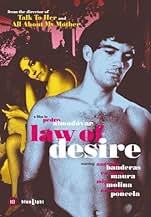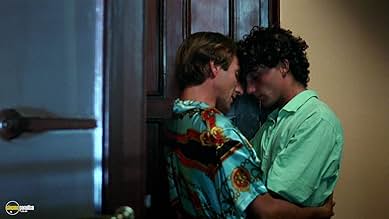IMDb-BEWERTUNG
7,1/10
15.030
IHRE BEWERTUNG
Füge eine Handlung in deiner Sprache hinzuA gay filmmaker becomes involved with an obsessive fan while still pining for his absent true love. Meanwhile, he shares a close but complex relationship with his trans sister, an actress.A gay filmmaker becomes involved with an obsessive fan while still pining for his absent true love. Meanwhile, he shares a close but complex relationship with his trans sister, an actress.A gay filmmaker becomes involved with an obsessive fan while still pining for his absent true love. Meanwhile, he shares a close but complex relationship with his trans sister, an actress.
- Regie
- Drehbuch
- Hauptbesetzung
- Auszeichnungen
- 10 Gewinne & 3 Nominierungen insgesamt
Fernando Guillén
- Inspector de policía
- (as Fernando Guillen)
Nacho Martínez
- Doctor Martín
- (as Nacho Martinez)
Bibiana Fernández
- Ada - madre
- (as Bibi Andersen)
Rossy de Palma
- Locutora tele.
- (as Rosy Von Donna)
Empfohlene Bewertungen
This film is centred on two siblings; Pablo, a gay film director who makes homo-erotic films; and his sister Tina, who is a transsexual lesbian who dreams of being an actress and is raising a ten year old girl named Ada who is the daughter of her former girlfriend. After Pablo's lover, Jaun, goes away for the summer he begins a relationship with Antonio, not suspecting that the latter will get dangerously jealous of his love for Juan.
As with most films by director Pedro Almodóvar the plot is secondary to the characters; it is there to put the characters in an interesting, and fairly melodramatic positions. This of course requires interesting central characters and here we get those. As is often the case they are a fairly unconventional group. There are things that may disturb some viewers such as Tina talking about her incestuous relationship with her father who persuaded her to get a sex change before leaving her... particularly shocking is that she doesn't feel abused. Pablo's relationships with Juan and Antonio are surprisingly frank for a film made in the eighties. The cast is solid with Eusebio Poncela and Carmen Maura really impressing as Pablo and Tina; Antonio Banderas is great as Antonio and young Manuela Velasco impresses as Ada. Things do get melodramatic towards the end but that doesn't feel out of place; in fact it is relatively mild compared to some of Almodóvar's other films. Overall I'd say this won't be for everybody but it is a must see for fans of Almodóvar's work.
These comments are based on watching the film in Spanish with English subtitles.
As with most films by director Pedro Almodóvar the plot is secondary to the characters; it is there to put the characters in an interesting, and fairly melodramatic positions. This of course requires interesting central characters and here we get those. As is often the case they are a fairly unconventional group. There are things that may disturb some viewers such as Tina talking about her incestuous relationship with her father who persuaded her to get a sex change before leaving her... particularly shocking is that she doesn't feel abused. Pablo's relationships with Juan and Antonio are surprisingly frank for a film made in the eighties. The cast is solid with Eusebio Poncela and Carmen Maura really impressing as Pablo and Tina; Antonio Banderas is great as Antonio and young Manuela Velasco impresses as Ada. Things do get melodramatic towards the end but that doesn't feel out of place; in fact it is relatively mild compared to some of Almodóvar's other films. Overall I'd say this won't be for everybody but it is a must see for fans of Almodóvar's work.
These comments are based on watching the film in Spanish with English subtitles.
I saw this film after having seen Bad Education, and there are many plot lines similar in both. I loved this film, not only am I a huge fan of Almodóvar, but in this film, the easy and simple beauty of the shots stood out. The acting was good, not amazing but good, particularly from Pablo and Tina. As well as directing beautifully, Almodóvar knows how to infuse a scene with sex, even if no sex is actually taking place-for example, when Antonio lights his cigarette of Pablo's. The film does become melodramatic towards the end, but I don't see this as a failing, melodrama, if done well, as it is here, need not be ridiculous
One of director Almodovars early films--and one of his best. A gay writer is basically stalked by a psychopath. The films manages to weave together comedy, drama and tragedy and make them all work! Also it manages to work in fairly explicit gay sex scenes and male nudity without it being exploitative--it just fits the storyline and characters. The movie takes a serious misstep about halfway through, throwing in a murder, but manages to regain its footing. The acting is pretty good--not great. Antonio Banderas is so-so as the psycho. I give him credit for engaging in gay sex scenes with no hesitation (I'd love to know what he thinks about this movie now!). The best thing about the movie is the direction--even when the story bogs down in spots, there's always something to look at on screen. Almodovar knows how to make films look beautiful and he, somehow, manages to have the settings fit the tone of the scene. How many directors can you say that about. An excellent film--well worth seeing. But if you're offended by explicit gay subject matter, stay away.
You will find all the familiar Almodovar devices here: telephones, drug use (cocaine in particular), dysfunctional families, sexual ambiguity, pedophile priests, and hospitals. These themes permeate his work, but they are woven intricately throughout this film.
Pablo (Eusebio Poncela) is a writer/director of fantastic movies. He gets into the snares of an obsessive (Antonio Banderas in a great performance) who has a fatal attraction and will kill for his love. At the same time, he has to deal with his transvestite sister played by Carmen Maura (Volver, Women on the Verge, Matador) in another magnificent role.
It is a melodrama about love as that is the overriding need for Banderas and for Maura, who has given up on men since her father left her. It is also about family. Of course, there is a crossing of genres as there is some comedy, but that is minor.
Another magnificent Almodovar film.
Pablo (Eusebio Poncela) is a writer/director of fantastic movies. He gets into the snares of an obsessive (Antonio Banderas in a great performance) who has a fatal attraction and will kill for his love. At the same time, he has to deal with his transvestite sister played by Carmen Maura (Volver, Women on the Verge, Matador) in another magnificent role.
It is a melodrama about love as that is the overriding need for Banderas and for Maura, who has given up on men since her father left her. It is also about family. Of course, there is a crossing of genres as there is some comedy, but that is minor.
Another magnificent Almodovar film.
10gonz30
THE LAW OF DESIRE opened the 1987 Miami Int'l Film Festival. Almodovar and Carmen Maura had already broken through to the American market at this event with WHAT HAVE I DONE TO... a few years earlier. So it was surprising to find them pacing nervously up and down the lobby of the C.Grove Playhouse at THE LAW's North American premiere. They were also in and out of its rest rooms, as the sold out audience roared in laughter and applauded the film, and I was making an early dash to the post-premiere party at the Viscaya Palace. They were acting just like the neurotic characters they bring to life in this and their other films. They were still insecure and frustrated that their huge popularity and celebrity status in Europe was reduced to a recent, almost cult, following in the U.S. They needn't have worried. The film confirmed both of these artists along with Antonio Banderas as stars among North American art movie lovers. (This achievement would be crowned the following year with the triumph of their next collaboration: the Oscar-nominated WOMEN ON THE VERGE...) But THE LAW OF DESIRE will be remembered as Almodovar's self-confessed most personal work, and the masterpiece of his earlier career. This film is pure Almodovar, before he toned down to more mainstream fare. LAW... resumes the Almodovarian style, in all its excesses. It features most of his muses, beyond Maura and Banderas: Rossy dePalma, Bibi Anderssen, Eusebio Poncela, and the rest. His style as a writer/director of women goes over the top here, as does his predilection with telephones, the police, drug use (cocaine in particular), the media, dysfunctional families, sexual ambiguity, the Catholic Church, and the city of Madrid. Almodovar fans will note that all the above themes permeate his work. But nowhere are they so well linked and exposed as in this landmark film.
Wusstest du schon
- WissenswertesThe iconic hose scene was shot twice. The first one wasn't useful because the pressure was so big that Carmen Maura fell down. While the crew adjusted the hose, Maura dried herself and changed the dress. The second time the scene was shot perfectly.
- Zitate
Pablo Quintero: It's not your fault if you don't love me and its not my fault if I love you.
- Crazy CreditsPedro Almodóvar appears in a scene as an employee in a DIY shop and serves Banderas's character.
- VerbindungenFeatured in Schau mir in die Augen, Kleiner (2007)
- SoundtracksSymphony No. 10 in E minor, Op. 93
Composed by Dmitri Shostakovich (as D. Shostakovich)
Performed by Orquesta Sinfonica de la Flarmonicade Mosou
Conducted by Kirill Kondrashin (as Kirill Kondrachine)
Top-Auswahl
Melde dich zum Bewerten an und greife auf die Watchlist für personalisierte Empfehlungen zu.
- How long is Law of Desire?Powered by Alexa
Details
Box Office
- Bruttoertrag in den USA und Kanada
- 72.442 $
- Eröffnungswochenende in den USA und in Kanada
- 13.399 $
- 13. Aug. 2006
- Weltweiter Bruttoertrag
- 101.773 $
- Laufzeit
- 1 Std. 42 Min.(102 min)
- Sound-Mix
- Seitenverhältnis
- 1.66 : 1
Zu dieser Seite beitragen
Bearbeitung vorschlagen oder fehlenden Inhalt hinzufügen










































